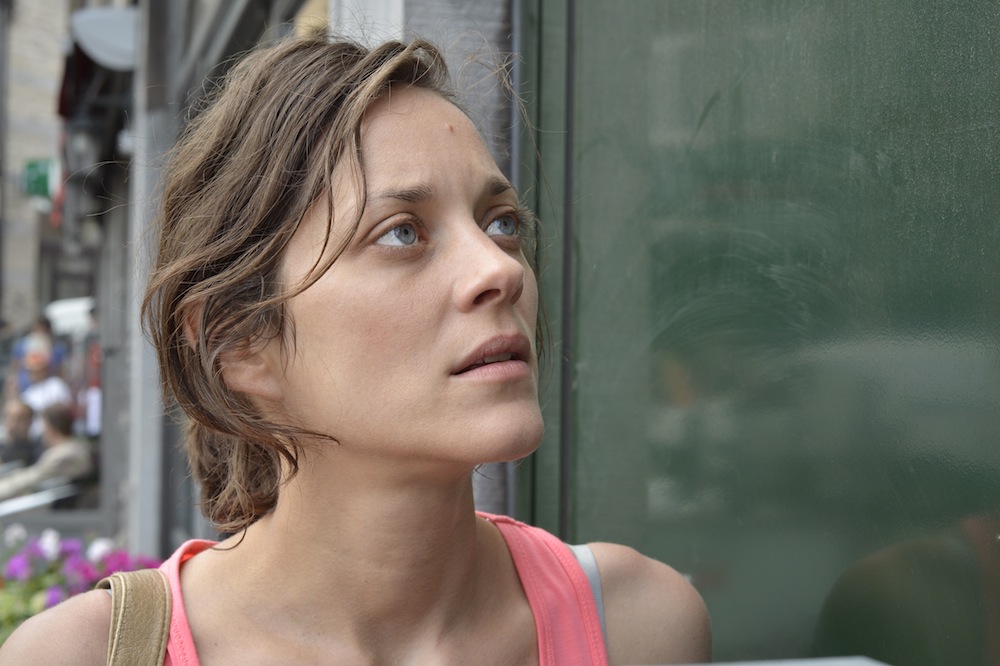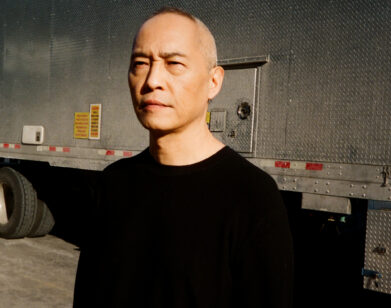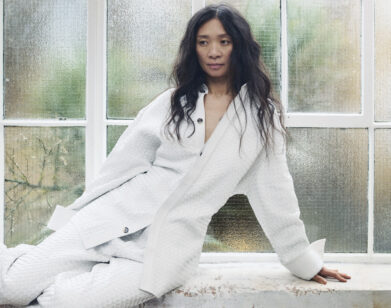A Weekend with Jean-Pierre and Luc Dardenne

ABOVE: MARION COTILLARD AS SANDRA IN TWO DAYS, ONE NIGHT. COURTESY IFC FILMS.
There is an urgent and at times heartbreaking humanity to the work of Jean-Pierre and Luc Dardenne. The Belgian brothers and writing-directing team concern themselves with society’s goodwill, or increasingly, the lack of it, in their latest film, Two Days, One Night. Set in the area around the Belgian port of Seraing, the film follows Sandra (Marion Cotillard), a struggling worker at a solar panel plant who is returning to work after a leave recovering from depression. Sandra is uplifted by the idea of returning to work and normalcy, and her self-worth falters at learning that the workers of the plant have voted, in an overwhelming majority, to take a thousand euro bonus in exchange for her firing. An emotion-twisting thriller, the Dardennes put Sandra on a quest as she sets out to convince her fellow workers to put themselves in her place, and forgo their bonuses, over the course of a weekend.
Interview spoke to the two-time Palme d’Or winners at the New York Film Festival earlier this year.
COLLEEN KELSEY: I read that you worked on the script for about 10 years. Where did this story originate?
LUC DARDENNE: The starting point for our story was something that we read in a sociology book, the story of a worker at Peugeot in France who had been expulsed from his team with the benediction of the boss who had incited them to put it to a vote. That team was not getting its bonuses and they pinned it on the fact that this worker was less productive than some of the other workers, and that there were other weaknesses, and so they voted to get rid of him. What was shocking was not that a worker would get fired, because people do get fired regularly for all kinds of reasons, but it was that the powers that be actually incited the workers to collaborate in the firing by voting on whether their coworker should stay or go.
JEAN-PIERRE DARDENNE: But that’s really before the film starts. The entire premise of the film is really this woman’s trajectory.
LUC DARDENNE: We tell a story of a woman who at the beginning has no confidence in herself or in others. She’s going to move around, she’s going to go see others, and in finding people where she recreates solidarity, she’s going to feel less alone, she’s going to regain confidence. At the beginning of the movie we find somebody that’s just emerging from a depression and she’s looking forward to going back to work. That’s going to give her the strength to pull herself together. At that point she finds out that she has lost her job and it sets her back.
KELSEY: Did you imagine much of a backstory for Sandra’s depression?
JEAN-PIERRE DARDENNE: No. We really didn’t do a backstory. The only thing that is clear is that there’s never been a link to her depression having come out of a burnout at work, that’s not an issue. Marion gave an hour-long interview where she talked about creating the role and the character, and there we learned—of course—she constructed a backstory for herself. But we never heard about it, we never talked about it.
KELSEY: When did you know that you wanted Marion for the role?
LUC DARDENNE: A long time ago.
JEAN-PIERRE DARDENNE: Maybe two, two and a half years ago. We were working on a screenplay at the time that was about a young doctor, and at the same time we were co-producers for Rust and Bone, so we thought, “We’re going to go over to the shoot just to say hello, and to meet Marion, and we’re going to see if something connects, or if it doesn’t.” We were thinking about perhaps her in the role as the young doctor. It was cinematic love at first sight! We told her a little bit about the part, and we said “We’d love to work with you,” and she said, “I would love to work with you,” and so we went back and we started to work on the screenplay but we had writer’s block. We couldn’t move forward with it. And at that point, the other screenplay that we left behind with Sandra started to come back to us with the face of Marion on it. So we started to work on that for the next two or three months. Even if we had worked on that character before and we didn’t really know who could suit it, we never really saw it. Once we started working on it again, we’d never really seen it with anyone but with Marion.
KELSEY: Each individual person who works at the factory has their own story, and each exchange with Sandra is an individual one based on their own backgrounds, but what really struck me was how some people had much more of a moral obligation. Timur probably has the most visceral reaction to seeing Sandra face-to-face, whereas some people won’t even open the door for her. You’ve created this story based on the fact that people are looking out for themselves and less likely to help someone, but is there a faith in people’s moral obligation to each other?
LUC DARDENNE: The vote was fourteen to two, and that’s important. One of the reasons that it may have swung that way is because Sandra was not physically in front of them. It’s possible that if she’d been there they would have stopped and thought a little bit, and maybe the vote would have been altered somewhat. But the fact that she hadn’t been there for two, three months made it that she’s less present, and it’s easier to vote in that direction. The fact that she is pushed to go meet the people individually face-to-face really does speak to in society there is an omnipresent sense of moral responsibility somewhere.
JEAN-PIERRE DARDENNE: It’s true that in the world that we’re in people are set up to compete so fiercely against each other and are pushed to think in terms of survival, having food on the table every day. But beyond that, there’s survival, and there’s survival. Survival at what cost? Is a certain standard of living equivalent to really having to survive? You need solidarity for a certain form of survival that is more important than that brute survival that people think of when they think in terms of competition and getting ahead.
Sandra is reaching for solidarity by asking her coworkers to put themselves in her place, and she also puts herself in their place—that’s the construct of the film. The first element of solidarity is Manu [her husband, played by Fabrizio Rongione] and Sandra. It’s happening in a world where the world is pushing people more and more to compete against each other and to be against each other. It’s a story that we’ve been carrying around for about 10 years, but I think where the world is today gave us a hand in telling it now.
KELSEY: How important is the rehearsal process before the film?
LUC DARDENNE: Very important. That’s how we discover the movie. The rehearsal process is crucial. It lasts about a month and a half, five, six hours a day. We rehearse and rehearse and rehearse and rehearse, and what we’re aiming for is for the actors to be stripped bare, to become vulnerable, to loose their defenses, and therefore, to let the character emerge naturally and to be created. We work with the costumes, with them, without them. Everything is filmed with a small camera; we look at what we’ve shot and make adjustments in terms of that. And we’re open, we’ll say, “You know, I think we made a mistake here. I think this doesn’t quite work.” The actors aren’t really used to that, but it opens them up. Then Marion will say, “Hey, I don’t think I did that quite right. I think I should adjust it this way.” And the whole process then… That’s how the movie becomes the movie, really.
JEAN-PIERRE DARDENNE: And we don’t say to Marion, “Okay, this is what the character is, this is how you have to paint the character.” You have to let yourself be worked with like clay; you just have to let it happen. You can’t decide that you want something, or be willful, or be obstinate about that you’re right and they’re wrong, etcetera. You have to let all that go. When we find something that works, I mean, it’s not that we’re unhappy to find something that works, it could be how Fabrizio gets on his knees next to Marion or how she falls or whatever. Those are all great things, but we’re not entrenched and rigid in terms of absolutely keeping those things. We say, “Okay, that worked. That was good,” or a camera angle, or a way to use a camera in a certain scene. There’s a flexibility involved.
KELSEY: At the end, despite some surprises and an atypical “happy ending,” Sandra still triumphs.
JEAN-PIERRE DARDENNE: It was the only organic way to end the movie. We had different endings in our minds but that was the only one that really ended up fitting. She spent two days and one night trying to have people put themselves in her place. And at the end, she was in a position where she had to put herself into someone else’s place who she could’ve taken the job from had she wanted to. She says, “We really put up a good fight,” to her husband. That’s why she’s triumphant, that’s why she’s feeling so good. The element of solidarity came full circle. She was able to do what she needed to do and find her source of strength.
TWO DAYS, ONE NIGHT IS OUT IN LIMITED RELEASE THIS WEDNESDAY, DECEMBER 24.






